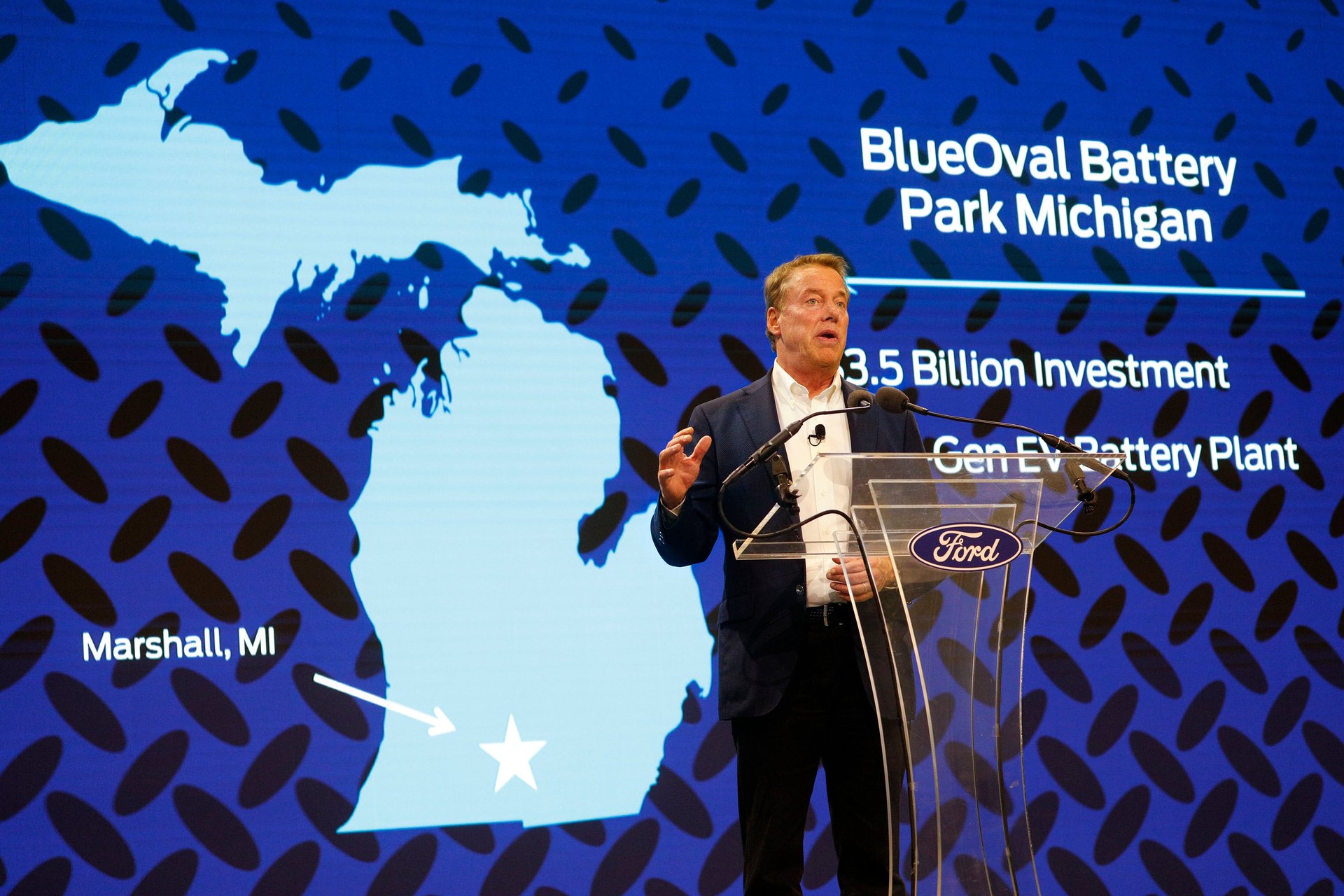Ford is betting that Biden's EV policies are here to stay
The automaker said it would ramp up domestic electric vehicle battery production

Ford Motor Co.’s (F) new roadmap for electric vehicles features big product delays and even cancellations. But it also shows that it isn’t too worried a potential Trump administration 2.0 would gut President Joe Biden’s flagship pro-EV legislation.
Suggested Reading
The Detroit automaker said Wednesday that it and partner firm LG Energy Solutions are looking to move some EV battery production out of Poland. Those batteries, which are used in Ford’s electric Mustang Mach-e, would instead be built in Holland, Michigan, sometime next year and qualify for the benefits created by the Inflation Reduction Act of 2022 (IRA).
The IRA included a number of measures intended to boost EV production and adoption.
For many people, the most important of those benefits is the $7,500 tax credit for new EVs. But that only applies to vehicles — and their batteries — that have a certain percentage of components sourced in the U.S. or a trade partner. The IRA also provides tax credits for battery production and critical mineral processing in the U.S.
Ford said that its BlueOval Battery Park Michigan is on track to begin making EV batteries in 2026, which will also qualify for IRA benefits, and its joint ventures in Kentucky and Tennessee are aiming to begin producing batteries in mid-to-late 2025. Those will be used for F-150 Lightning pickups, E-Transit vans, and an all-new commercial van announced Wednesday.
“An affordable electric vehicle starts with an affordable battery,” Ford CEO Jim Farley said. “If you are not competitive on battery cost, you are not competitive.”
However, some EV advocates are worried that the benefits making those batteries and vehicles cheaper may be ripped away if former President Donald Trump wins the November presidential election. In the past, he has promised to freeze the IRA’s grants and subsidies, remove rules curbing tailpipe emissions, and recently toyed with the idea of ending the $7,500 EV tax credits.
Ford’s decision shows that automakers aren’t exactly worried that Trump could get the IRA overturned, RBC Capital (RY) analysts said in a Wednesday note.
“[W]e think Ford’s decision affirms something we have long been arguing - namely that undoing the IRA would be very difficult for any administration,” analyst Tom Narayan wrote Wednesday. “It also affirms the power of the IRA to absorb high battery costs,” he added.
Undoing the IRA would need Congressional support, which may be difficult to raise given who benefits from its provisions.
Red states and battleground states have received thousands of new jobs from the IRA’s push for clean-energy investments. Ohio, the state that Trump’s running mate J.D. Vance represents in the Senate, has a booming clean-energy sector. It’s also home to General Motor’s Ultium Cells factory in Lordstown.
A hybrid hedge
Ford is also expanding its line of hybrid vehicles, which have been a money-making business for companies like Toyota Motor, which has been slower to embrace the transition to all-electric cars. Although EV sales are growing, they’re doing so at a slower pace than the industry had hoped for as consumers remain skeptical.
Ford said it would cancel its plans to develop electric three-row SUVs, which the automaker had previously said would be delayed by two years to a 2027 release date, in favor of hybrid models. It also aims to sell a hybrid version of its next-generation F-Series Super Duty pickup trucks.
“[W]e are future-proofing this valuable franchise across all sizes with hybrid, electric and other electrified propulsion options, giving individual customers and businesses choice based on how they use their trucks,” Farley said in a statement.
The move resembles a shift from Hyundai Motor (HYMTF); the firm’s chief financial officer said last month that it doesn’t expect the IRA to be scrapped by a Trump White House. But Hyundai still plans to review the possibility of building more hybrid vehicles to prepare for any changes to the IRA and its benefits for EVs. The South Korean automaker’s hybrid sales were up 42% during the April to June quarter.
Although its vehicles don’t yet qualify for the IRA’s benefits, Hyundai has fast-tracked its plans for a new $7.59 billion factory in Ellabell, Georgia, and aims to build a $5 billion EV battery plant in Bartow County. Once operational, Hyundai expects to build 300,000 EVs annually in the state.
“We’re pulling ahead because everybody knows how important it is because so far we don’t qualify for federal tax credits,” Hyundai Motor (HYMTF) America CEO Jose Munoz told Automotive News in February.
